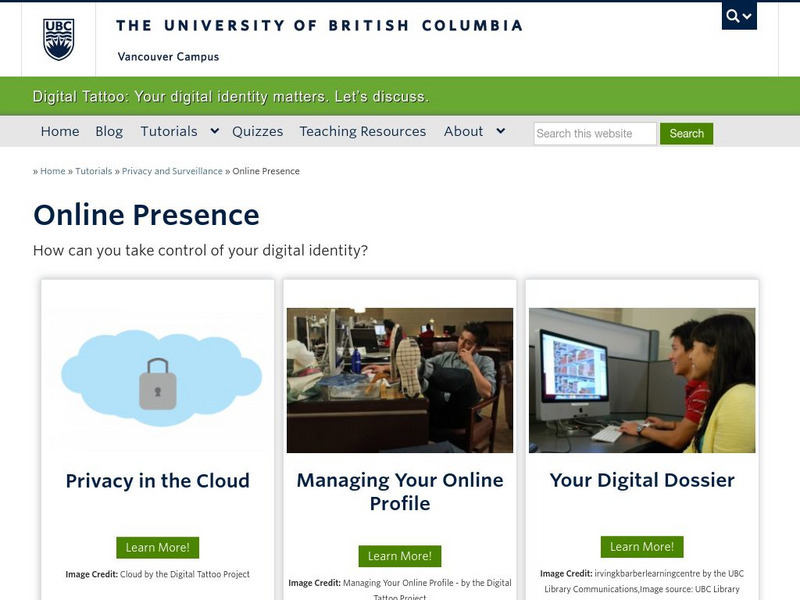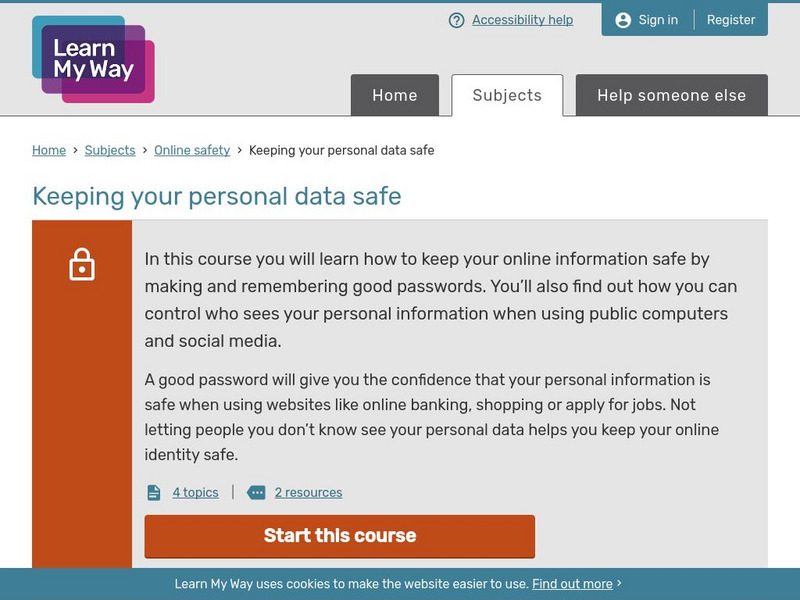Other
Wosu Public Media: Are You Digi Fit?: Who Are You Online? [Pdf]
This is a brief K-4 lesson summary that links to a Common Sense Media slideshow. It looks at what a digital footprint is and how it can be positive or negative and influence how people see you now or in the future. The slideshow can be...
Common Sense Media
Common Sense Media: Education: Lesson: Digital Trails
[Free Registration/Login Required] Does what you do online always stay online? Students learn that the information they share online leaves a digital footprint or "trail." Depending on how they manage it, this trail can be big or small,...
Common Sense Media
Common Sense Media: Education: The Power of Digital Footprints
Our digital footprints can impact our future. What others find about us online shapes how they see us or feel about us. Help your students learn about their digital footprint and the steps they can take to shape what others find and see...
Common Sense Media
Common Sense Media: Education: Trillion Dollar Footprint [Pdf]
Students learn that they have a digital footprint, which can be searched, shared, and seen by a large, invisible audience. Students then learn that they can take some control over their digital footprint based on what they post online....
Other
Controlling Children's Passwords Is a Flagrant Breach of Their Privacy
Passwords, by definition, are secrets. We use them to identify ourselves to systems and gain authorized access to places that other people are denied access to. Every online account is an identity, but only if it is reserved for the...
University of British Columbia
University of Bc: Digital Tatoo: Privacy and Surveillance: Online Presence
How can you take control of your digital identity? Learn about privacy in the cloud, managing your online profile, and digital dossiers. Resources include videos, quizzes, and ideas to discuss and explore.
Other
Childnet International: Digizen: Social Networking Detective
This social networking profile has been created to stimulate discussion about safe and potentially unsafe practices and features on social networking sites. Together with the accompanying questions, it has been designed to highlight ways...
Council for Economic Education
Econ Ed Link: Cybersecurity and Economics: Protecting Your Identity Online
Help students answe the esential question, "What should you do before you share information on the Internet?"
BBC
Bbc Newsround: Tips for Good Passwords
This article presents common mistakes for creating insecure passwords and provides advice on creating strong passwords.
CommonLit
Common Lit: Online Identity
A learning module that begins with "Online Identity," accompanied by guided reading questions, assessment questions, and discussion questions. The text can be printed as a PDF or assigned online through free teacher and student accounts....
Learn My Way
Learn My Way: Keeping Your Personal Data Safe
In this online course, students will learn how to keep their online information safe by making and remembering good passwords and also how to control who sees their personal information when using public computers and social media.
CommonLit
Common Lit: "Online Identity" by Common Lit Staff
The Internet has heavily shaped our notion of identity. On the Internet, people can create a multitude of personas, some of which can be created with false information. As you read, take notes on the ways in which people express their...
Other
Elk Grove Unified School District: Digital Citizenship: Digital Footprint
A digital footprint is all of the information online about a person either posted by that person or others, intentionally or unintentionally. Filling out a form, leaving a blog comment, updating your status, checking into a location,...
Common Sense Media
Common Sense Media: Education: The Change You Want to See
Research shows that happiness in life is less about what you do and more about why you do it. When your actions have purpose, they lead to positive results -- both for you and the world. Help students use the power of the internet to...
Common Sense Media
Common Sense Media: Education: Who's Looking at Your Digital Footprint?
Our digital footprints can have a powerful impact on our future. This can be a scary thought, given that what's in our digital footprint isn't always in our control. Teach students that digital footprints are an opportunity to showcase...
Common Sense Media
Common Sense Media: Education: Curated Lives
Social media gives us a chance to choose how we present ourselves to the world. We can snap and share a pic in the moment or carefully stage photos and select only the ones we think are best. When students reflect on these choices, they...
Common Sense Media
Common Sense Media: Education: Protecting Online Reputations
Tagging friends on social media is a great way to connect with others and capture memorable experiences. But what if they don't want to be tagged? Encourage your young scholars to take responsibility for how they may affect the digital...
Childnet
Childnet: Online Safety: Online Identity for Ages 3 18
This is a series of education packs to encourage young people aged 3-18 to explore how they manage their online identity, and how the internet shapes how they think of themselves and others. Each pack contains a selection of resources,...


![Wosu Public Media: Are You Digi Fit?: Who Are You Online? [Pdf] Lesson Plan Wosu Public Media: Are You Digi Fit?: Who Are You Online? [Pdf] Lesson Plan](https://d15y2dacu3jp90.cloudfront.net/images/attachment_defaults/resource/large/FPO-knovation.png)



